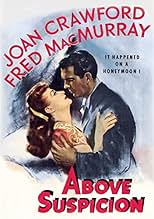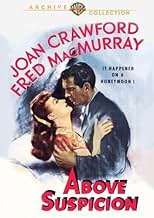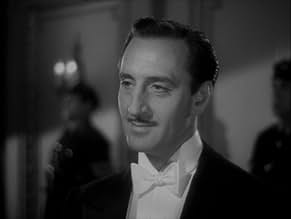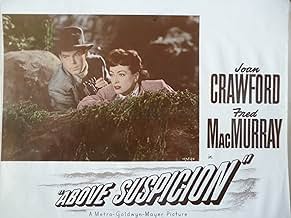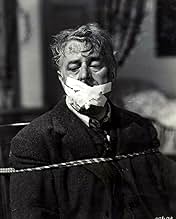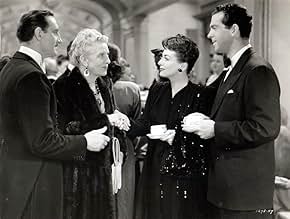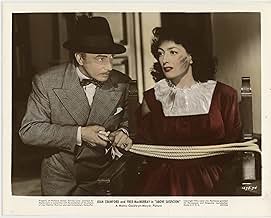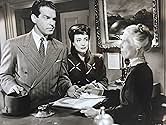Aggiungi una trama nella tua linguaOxford Professor Richard Myles and his new bride Frances are off on a European honeymoon. It isn't the typical honeymoon: they are on a spying mission for British Intelligence on the eve of ... Leggi tuttoOxford Professor Richard Myles and his new bride Frances are off on a European honeymoon. It isn't the typical honeymoon: they are on a spying mission for British Intelligence on the eve of World War II.Oxford Professor Richard Myles and his new bride Frances are off on a European honeymoon. It isn't the typical honeymoon: they are on a spying mission for British Intelligence on the eve of World War II.
- Regia
- Sceneggiatura
- Star
- Premi
- 1 vittoria in totale
- Ottilie
- (as Lotta Palfi)
- Student
- (non citato nei titoli originali)
- German Woman
- (non citato nei titoli originali)
- Poet at Frisky Rabbit
- (non citato nei titoli originali)
- Guide
- (non citato nei titoli originali)
- German Boy
- (non citato nei titoli originali)
Recensioni in evidenza
All that aside, this is still a topnotch suspense movie from World War II. The flick is fast-paced and has worn well with the passage of time, since all the goings on are now just history to most viewers. Since director Richard Thorpe was an old hand at directing action pictures he lets the show get on the road and move along rapidly. He throws humor in from time to time to ease the tension the way Hitchcock would do in a more masterful way. Viewers used to seeing Basil Rathbone play Sherlock Holmes will enjoy seeing him play a dastardly Nazi stooge who receives his just desserts. In the opposite direction viewers may also enjoy seeing Conrad Veidt playing a good guy who assists the newlyweds Frances and Richard Myles (Joan Crawford and Fred MacMurray)in their dangerous mission inside Nazi Germany. Those who enjoy World War II espionage films, should find this one a winner.
Barzin Samimi
Tehran, Iran
An odd movie even for its time, being clearly anti-Nazi and a bit of an American adventure on behalf of the British, but set in the months before the war began, earlier 1939. Yet it was made and was released in the thick of the war, four years later, well after even the Americans were involved. It must have seemed a bit lightweight at the time, and it certainly is a bit breezy now, too.
Joan Crawford is at her best when life is going wrong, when the screws are applied or when she has to be a tough and independent women. Here she plays a cheerful and rather carefree newlywed. What Crawford character is truly carefree? Well, in this case her husband is perfectly cast, because Fred MacMurray knows what carefree is better than anything. When the Nazi threat becomes violent, things turn out rather okay, at least at first. The only other actor of note is the Nazi figure, played by the guy who plays Sherlock in all those B-Movie Sherlock Holmes films, Basil Rathbone, and you can't quite make him out as the evil menace he needs to be.
Of course, our leading odd couple has been chosen for this mission by some knowing British officials who see the American innocence as a perfect cover for what is actually pretty dangerous stuff. And the movie, despite all these essential weaknesses, is really fun and a bit dramatic and very well made. Yes, it's a good movie, if far from a great one in either importance or effect.
The director, Richard Thorpe, is one of the step-in-when-needed guys with a bunch of B-movies under his belt, and an assortment of mediocre oddballs (a Tarzan movie, the last Thin Man, a Presley movie--Jailhouse Rock--some Westerns, and so on). It might be a miracle this is as workable as it is. The script is fair, but the mood and the setting is terrific. And really, as mismatched as they seem, Crawford and MacMurray are not half bad together. They certainly are trying very hard.
** 1/2 (out of 4)
By-the-numbers WWII drama from MGM has Joan Crawford and Fred MacMurray playing newlyweds who are asked by the government to do some spying as they make their way into Nazi controlled territory. ABOVE SUSPICION was one of the hundreds of films turned out by Hollywood to motivate or at least pursued the country to support the war and to show how evil the Nazi party was. With so many films in this sub-genre it's always hard to find a "great" film and this here certainly isn't one of them. While the film remains slightly entertaining from start to finish, there's really no way to deny the fact that there's just nothing overly special here and it's also incredibly uneven. I say uneven because the tone of the film seems to change from one scene to the next. Sometimes you feel as if you're watching some sort of light comedy and then the next minute everything is being handled so heavily. At times there seems to be a wink-wink going on between the two leads and then the next second everything is back to being dead serious. I thought the entire tone of the film was just wrong and it was incredibly hard for me to believe the story or take it too serious. Both Crawford and MacMurray are good in their roles, although I'm not so sure they play were together. I really didn't buy them as a married couple and I also didn't buy them working together on these missions. Conrad Veidt is good in his role as a good German and Basil Rathbone steals the film as the evil German. Reginald Owen has a good supporting part as well. Again, at just 90-minutes the film moves well enough but there's just not enough going on here to make it worth watching except for fans of the cast.
Lo sapevi?
- QuizThis was the final film Joan Crawford made under her long-term contract with MGM, where she had been for the past eighteen years. Frustrated at being continuously offered what she considered second rate scripts, shortly after completing this, Crawford chose to buy out her studio contract (at great personal expense) and continue her career elsewhere. It was nearly two years later that she appeared in her next leading role, Il romanzo di Mildred (1945) at Warner Brothers, for which she won the 1945 Academy Award as Best Actress.
- BlooperThe song that represents Oxford in the film is the Eton Boating Song.
- Citazioni
[on their wedding night, a policeman appears at the Myles's hotel room door demanding Richard's depart with him immediately]
Frances Myles: This is no time for a practical joke.
Const. Jones: It's no joke, ma'am.
Frances Myles: It's not practical, either.
- ConnessioniReferenced in Unfinished Business (1985)
- Colonne sonoreThe Wedding March
(1843) (uncredited)
from "A Midsummer Night's Dream, Op.61"
Music by Felix Mendelssohn
In the score after Frances and Richard's wedding
I più visti
Dettagli
- Tempo di esecuzione1 ora 30 minuti
- Colore
- Proporzioni
- 1.37 : 1

